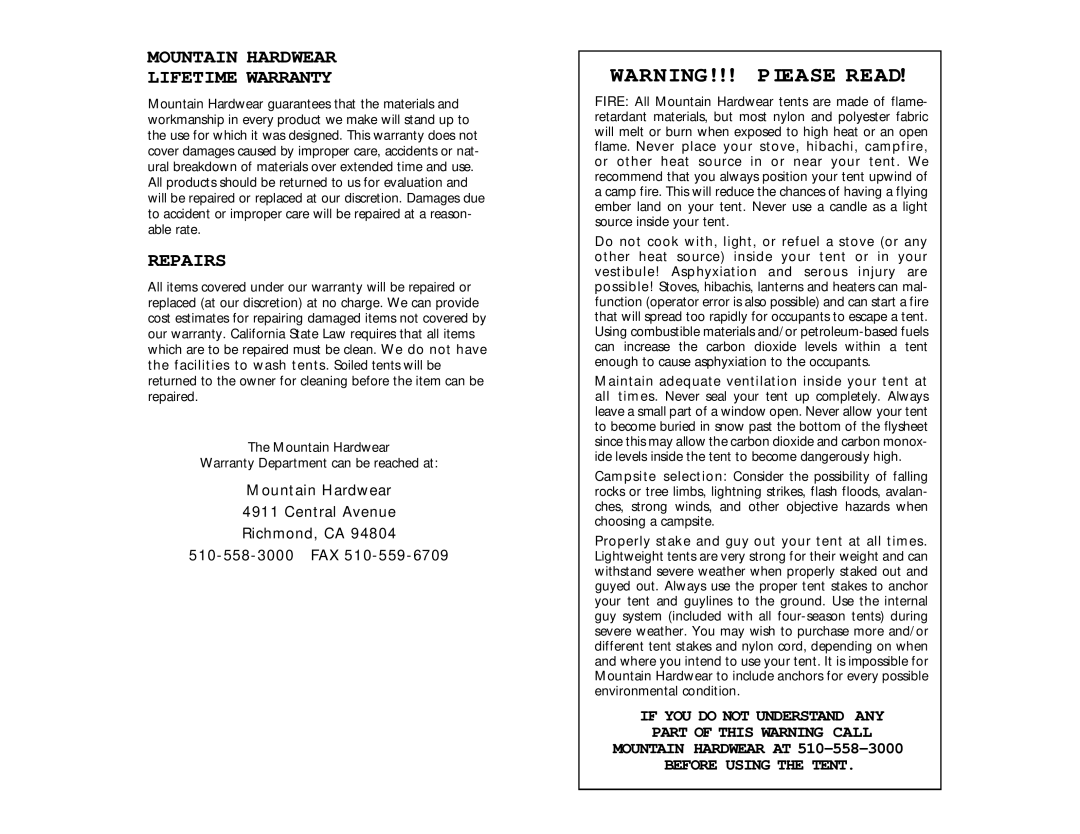
MOUNTAIN HARDWEAR
LIFETIME WARRANTY
Mountain Hardwear guarantees that the materials and workmanship in every product we make will stand up to the use for which it was designed. This warranty does not cover damages caused by improper care, accidents or nat- ural breakdown of materials over extended time and use. All products should be returned to us for evaluation and will be repaired or replaced at our discretion. Damages due to accident or improper care will be repaired at a reason- able rate.
REPAIRS
All items covered under our warranty will be repaired or replaced (at our discretion) at no charge. We can provide cost estimates for repairing damaged items not covered by our warranty. California State Law requires that all items which are to be repaired must be clean. We do not have the facilities to wash tents. Soiled tents will be returned to the owner for cleaning before the item can be repaired.
The Mountain Hardwear
Warranty Department can be reached at:
Mountain Hardwear
4911 Central Avenue
Richmond, CA 94804
WARNING!!! PLEASE READ!
FIRE: All Mountain Hardwear tents are made of flame- retardant materials, but most nylon and polyester fabric will melt or burn when exposed to high heat or an open flame. Never place your stove, hibachi, campfire, or other heat source in or near your tent. We recommend that you always position your tent upwind of a camp fire. This will reduce the chances of having a flying ember land on your tent. Never use a candle as a light source inside your tent.
Do not cook with, light, or refuel a stove (or any other heat source) inside your tent or in your vestibule! Asphyxiation and serous injury are possible! Stoves, hibachis, lanterns and heaters can mal- function (operator error is also possible) and can start a fire that will spread too rapidly for occupants to escape a tent. Using combustible materials and/or
Maintain adequate ventilation inside your tent at all times. Never seal your tent up completely. Always leave a small part of a window open. Never allow your tent to become buried in snow past the bottom of the flysheet since this may allow the carbon dioxide and carbon monox- ide levels inside the tent to become dangerously high.
Campsite selection: Consider the possibility of falling rocks or tree limbs, lightning strikes, flash floods, avalan- ches, strong winds, and other objective hazards when choosing a campsite.
Properly stake and guy out your tent at all times.
Lightweight tents are very strong for their weight and can withstand severe weather when properly staked out and guyed out. Always use the proper tent stakes to anchor your tent and guylines to the ground. Use the internal guy system (included with all
IF YOU DO NOT UNDERSTAND ANY
PART OF THIS WARNING CALL MOUNTAIN HARDWEAR AT
BEFORE USING THE TENT.
